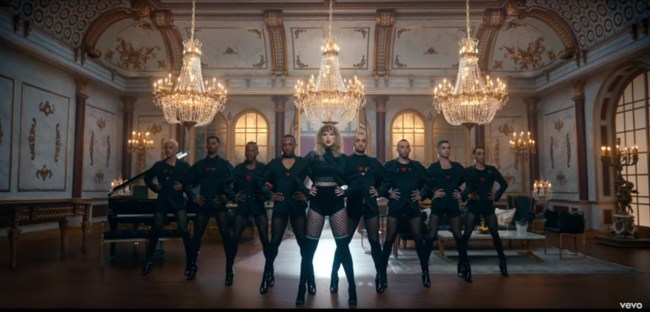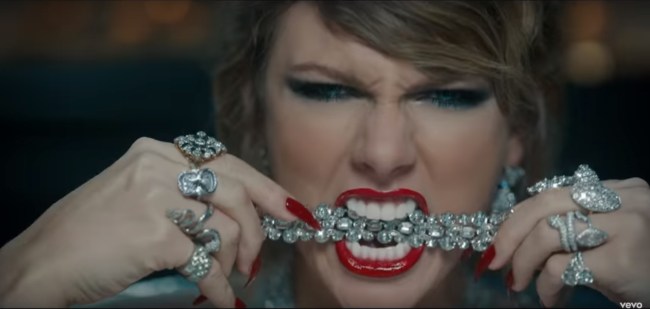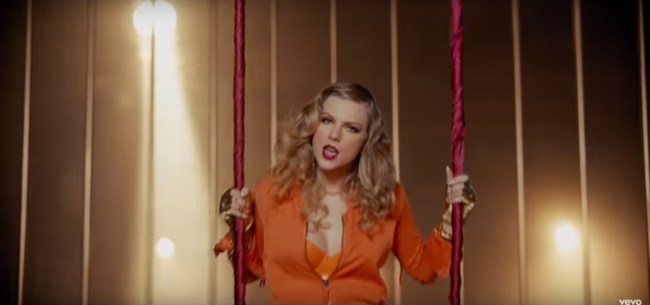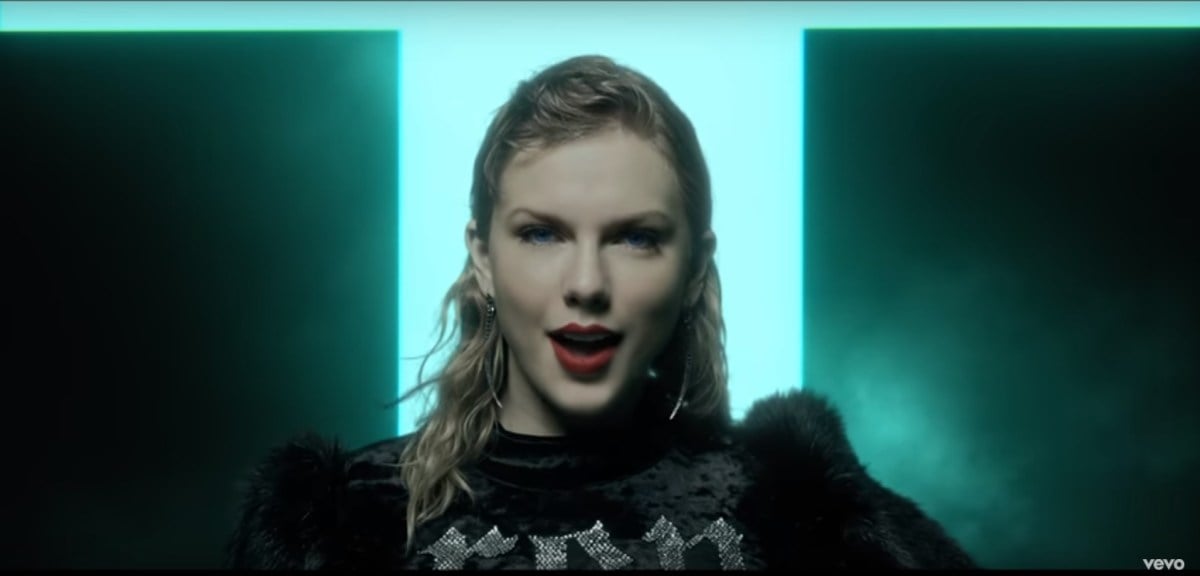At this point we’ve likely all heard about Taylor Swift’s new single “Look What You Made Me Do,” the first off her upcoming album, Reputation. Now, it seems as though it’s poised to reach #1 on the Billboard Top 100 chart next week, and my question is: why? Also, what does this say about how we consume (or don’t) what we say we value?
First, I’m a fan of Taylor Swift’s music. The girl knows song craft. I’ve been a fan since the days when she was more country, and as I’m an unabashed, unashamed lover of pop music, I’ve enjoyed watching her transition from country to pure pop. I seat-dance in my car to “Shake It Off” on the regular. So, I say this as someone with a huge amount of respect for Swift’s ability to write a solid song.
“Look What You Made Me Do” isn’t any good. It’s barely a song. It’s what happens when five songs come together to have a fight … only none of them wins. From the weird, arrhythmic chorus, to the abrupt ending, to the unpleasant sound of the out-of-place second pre-chorus about “drama drama,” it’s a grating listen. In the video, it becomes clear as you watch Swift and her dancers struggle to find a rhythm or a beat to dance to, finding none, and needing to dance for the video anyway. It’s painful to watch.
Even more painful is the fact that the song is clearly not even the point. The song is the hook on which the “drama drama” hangs. Much like, tortilla chips are really just the vehicle for guac, “Look” is just the vehicle for Swift to get to do a video where she gets to insult people and defend herself. There’s a full minute of video after the song ends devoted to her being snarky in each of her previous career personas. All the production value, all the hype … in service of the drama, not the song.
She’s certainly not the first person to do this. The music industry probably makes most of its money on “beef.” I’m using her as the latest example, not to single her out. But here’s the thing: this non-song that only exists as a diss track, with this video that is a pale effort compared to Swift’s other, stronger videos may become Number One on the Billboard Top 100 next week. Why?

People are and have always complained about “music today” being of inferior quality. To hear people tell it, music is always getting worse, never better. There’s a certain generational element to that, but there are even young people who listen to older music and talk about how it was better “back then.” Personally, I don’t buy into that. There was just as much crap “back then” as there is now…we just don’t talk about it or remember it. Because it was crap.
Meanwhile, what makes a song resonate with an individual is incredibly subjective. There’s also something to be said for the enjoyment of something “so bad it’s good,” and there are plenty of novelty songs that have hit the Top 100, too. And, of course, there may be people out there who disagree with me entirely and think that “Look” is Swift at the top of her game, embracing the fullness of her songwriting prowess. To each their own.
However, what feels different about this is that it seems representative of something larger about us as fans and as humans.
Despite our objections to the contrary; despite claiming to want things that are genuine, and meaningful, and true, we are consistently drawn to the things that feed our worst impulses. We listen to and download “Look” over and over, whether we think it’s a good song or not, because we get a vicarious thrill out of Taylor Swift telling off a Kardashian (and possibly also Katy Perry) in song form. Likewise, despite everyone talking about how much they hate those Kardashian/Jenners, we do indeed keep up with them, because we get a vicarious thrill out of them being that rich, that oblivious to life’s harshest problems.
We click on articles with sensational (or at least carefully SEO’d) headlines that feed on our morbid curiosities even as we complain about “click-bait” articles. Then, we wonder why that’s all we ever see.
And it isn’t just a “modern-day,” “Digital Age,” Internet-based problem: metrics don’t care about why, they only care about numbers.

The algorithms on Spotify don’t care that you’re hate-listening to a song over and over, playing it for your friends so that you can all talk about how horrible it is (OMG, you have to listen to this. It’s so bad!). All they know is that you and a bunch of other people have listened to a particular song a crap-ton of times. That song becomes a hit. Meanwhile, you have an album by a lesser-known artist with superior talent that that you’ve downloaded with all the best intentions that you “just haven’t found the time” to listen to. That artist flounders.
The Internet doesn’t care that you’re only clicking on that headline to complain. Your click means you loved it. Or, more accurately, your click means that this is content you’re interested in and want to see more of. The Internet obliges, giving you more of that kind of content.
Meanwhile, there is content that you say you want, but when it’s offered, you keep “meaning to” check it out, but not … actually … checking it out. There have been times where we’ve written posts right here on this very site, where we’ve focused on the efforts and successes of women of color, for example—something many readers say they want—but those articles somehow get the fewest clicks, if they get clicked on at all.
Yet if we post a controversial opinion about something, or call out the questionable behavior of someone with a platform, or yes, write about a white girl like Taylor Swift, it gets clicked on. Whether one is clicking because they like Taylor Swift, or they’re clicking because they want to complain that she gets attention at the expense of others doesn’t matter. A click is a click.
This has always been true of television ratings, newspaper circulation numbers, etc, etc. They measure how many people look at a thing, not what they’re feeling while they’re doing it. So, by picking up, clicking on, and listening to things you hate, you’re contributing to more of that thing, and by not picking up, clicking on, or listening to the things you say you want to see more of, those things can’t exist.

Metrics can’t read your mind, or know what’s in your soul. They only knows the numbers with which they’re supplied.
Something to keep in mind: don’t be ashamed of the things you like. There shouldn’t be anything “guilty” about anyone’s pleasures, and I’m not here to pass judgement on anyone’s joys. If you’re clicking on something because you genuinely want to enjoy it, or are curious about it, do it!
However, many of us (myself included) find ourselves talking over and over about how the world today is full of horrible things we don’t want to see…and yet we remain stuck participating in these systems with seemingly no way out.
Rather than voting against things, we should think about voting for things. As consumers of content, we should never be passive, and we cannot be absolved of all responsibility for the products/music/shows/films that exist when our mouths publicly say one thing, but our private streams, downloads, clicks, and ticket purchases say something else.
A huge thing you can do to, as they say, “be the change you want to see in the world,” is use your clicks wisely. Use your downloads and streams wisely. Every click, share, like, stream, and view is a choice. You’re voting for a thing. You’re voting in favor of a thing. And so, the best way to work toward seeing the better world we want is by supporting what we love, rather than clicking on, reading, downloading, streaming, the things we want to rail against.
Uh-oh. I got you here with a headline about Taylor Swift and turned it into a “click-bait” article to get you to read about how you should better use your media choices. Look what you made me do.
(image: screencap)
Want more stories like this? Become a subscriber and support the site!
—The Mary Sue has a strict comment policy that forbids, but is not limited to, personal insults toward anyone, hate speech, and trolling.—









Published: Aug 29, 2017 02:42 pm